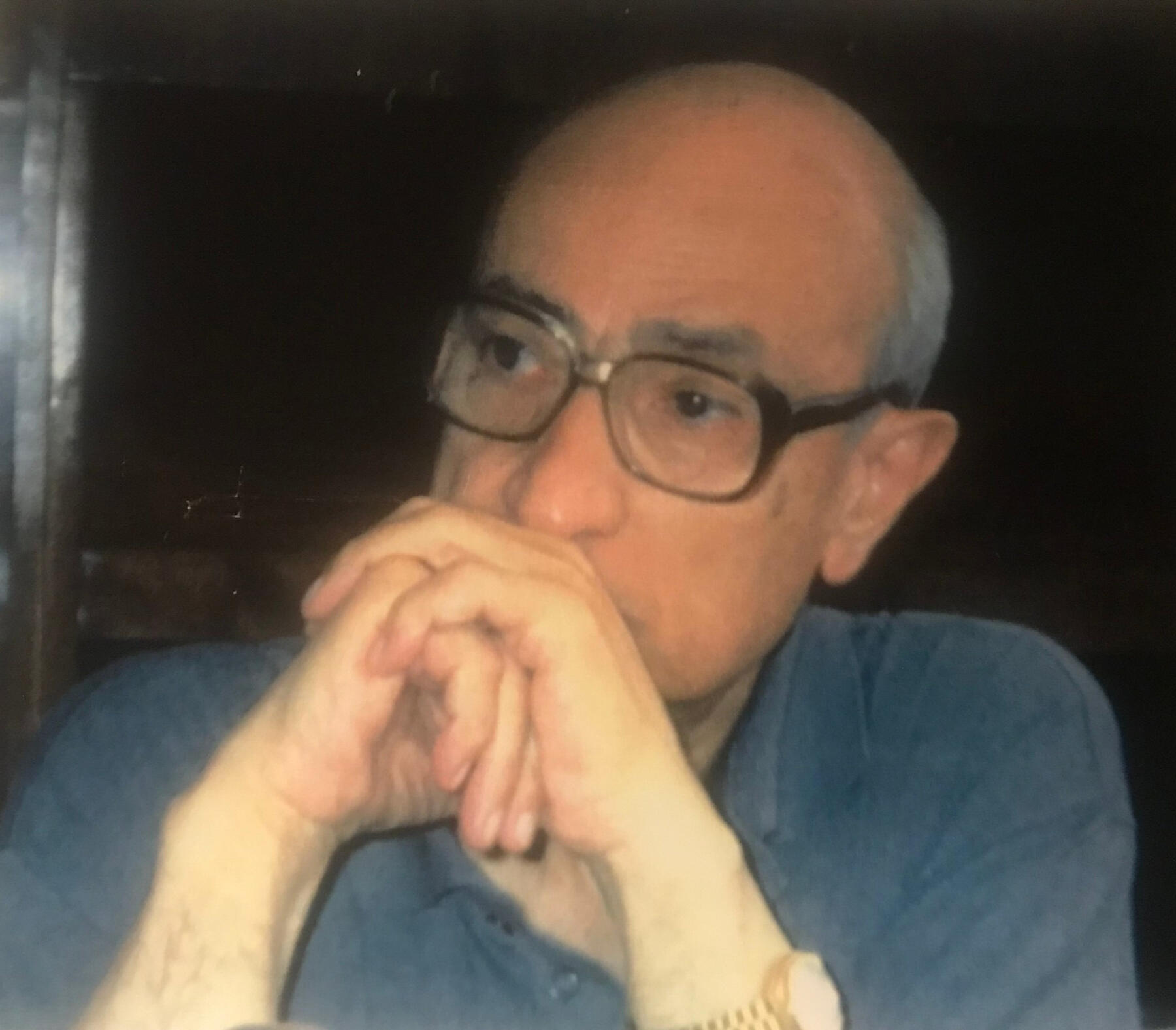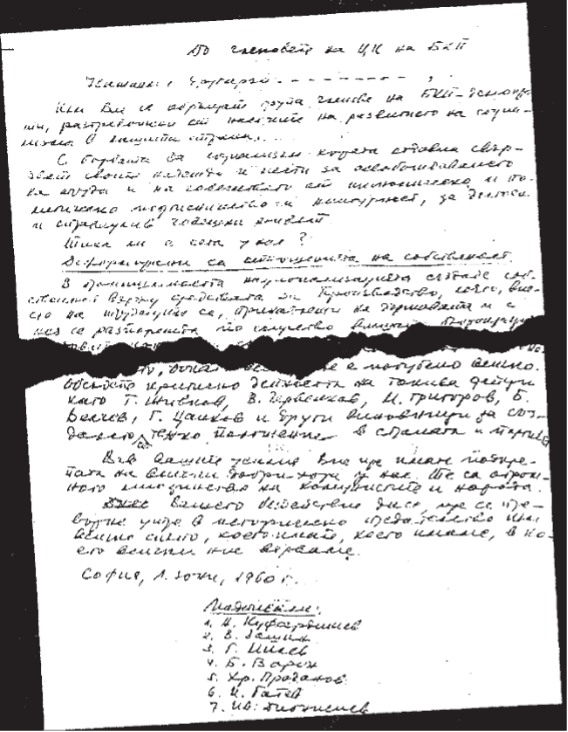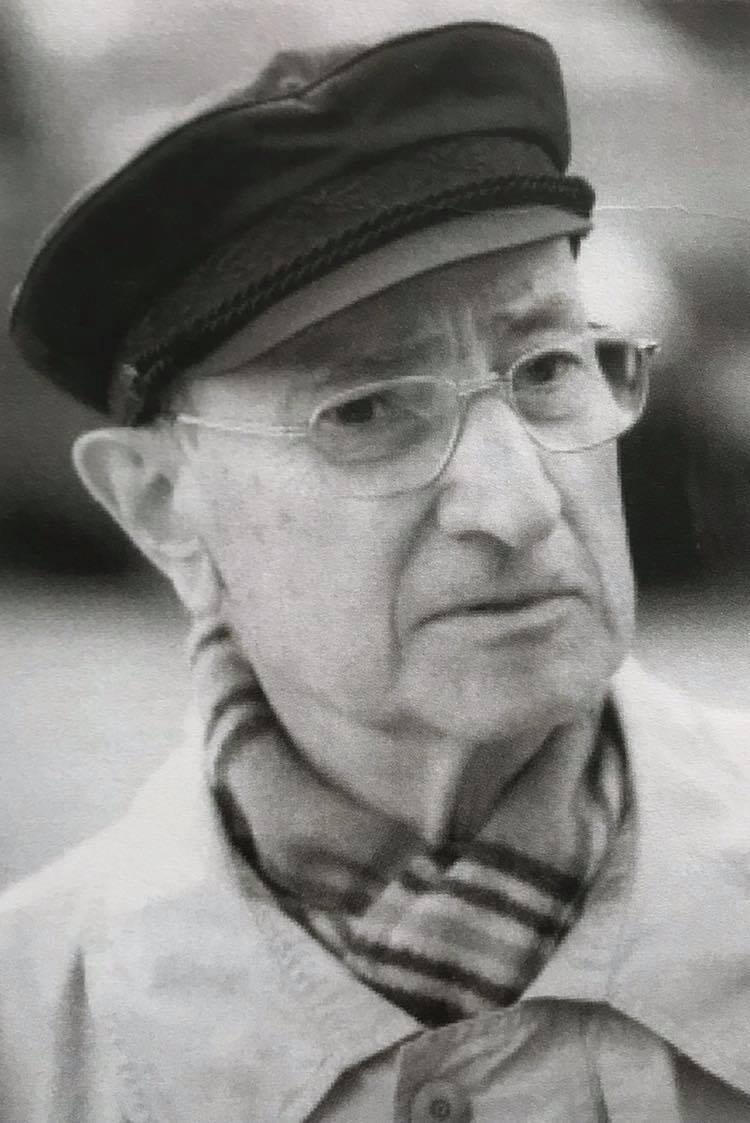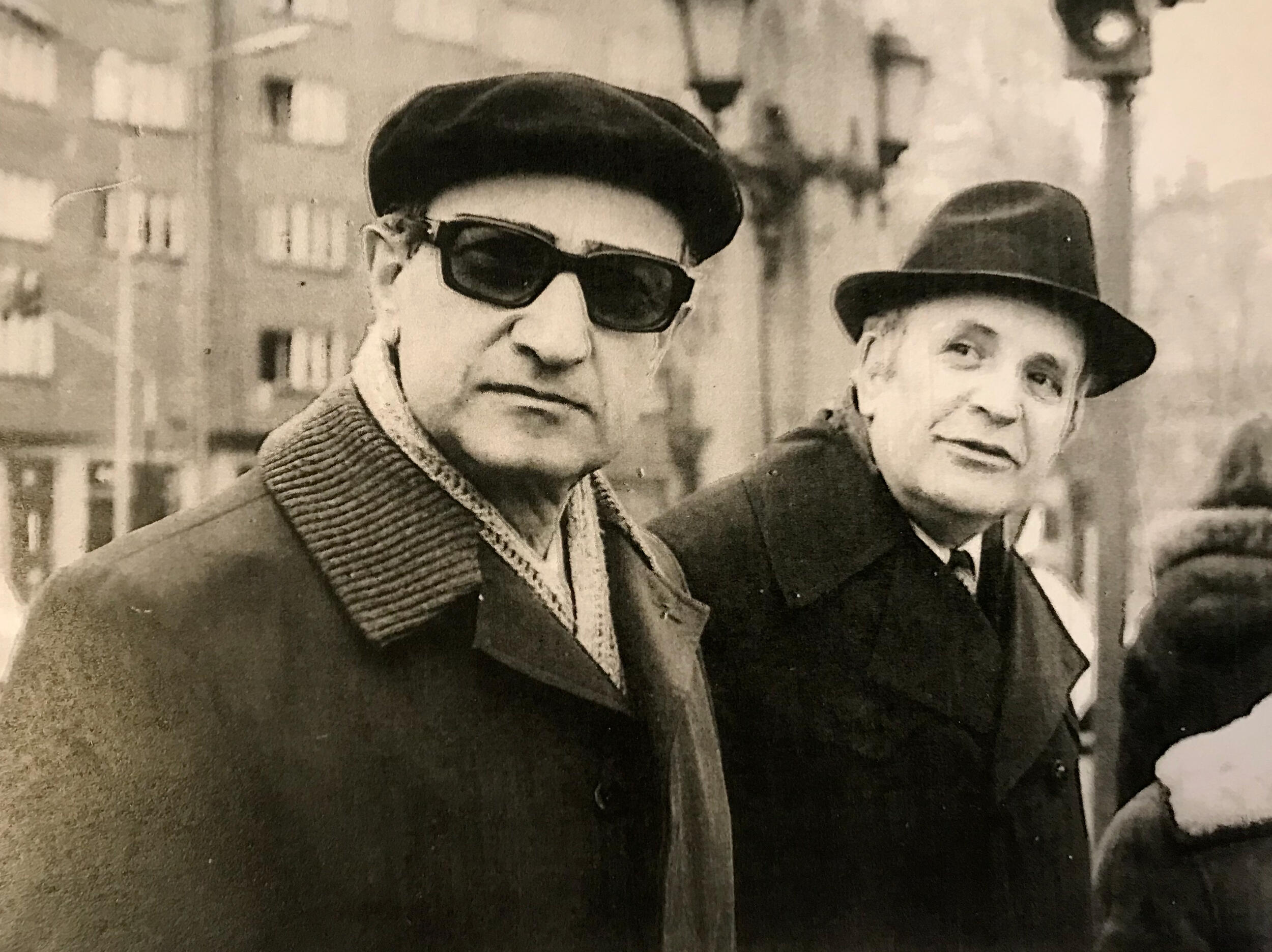Benjamin Varon
The Burning Paths to the Future
The publication of The Burning Paths to the Future by Benjamin Varon marks the 60th anniversary of the writing of the historic letter of 1 June 1960 by Kufardjiev’s Group of Seven.
The Book
The book „The Burning Paths to the Future“, published in memoriam, is a collection of selected works from two earlier books, Paths (1999, 2000, 2001) and Capitalism – Antagonist of Humankind (2004). It comprises Varon’s most significant and emblematic theoretical writings. His intellectual and philosophical insights recall the tradition of Bulgarian and foreign Marxist thought. What is more, the book contains ideas that have advanced Marxist philosophical thought at the turn of the 21st century.The book contains the core of the intellectual legacy bequeathed by Benjamin Varon – a Renaissance mind, an economist, scholar and philosopher whose perceptive articles and studies abound in brilliant heuristic insights and present an exciting read for researchers.The publication was a collaboration between Zakhari Stoyanov Publishing House and Raymonda Varon-Mateeva, daughter of the remarkable thinker. The profound message of the book will continue to inspire future historians and philosophers.

The publication of The Burning Paths to the Future by Benjamin Varon marks the 60th anniversary of the writing of the historic letter of 1 June 1960 by Kufardjiev’s Group of Seven.
“I have a thousand reasons to detest the brutality of real socialism, but I cannot think of a single one that puts an equality sign between the villains, the distortions, the crimes, and socialism.”
- Benjamin Varon
“I fought for my ideas as best as I could - first under fascism and then under totalitarianism.” Varon is still fighting dramatically and intensely for his ideas. His questions are equally disagreeable to left and right politicians alike.”
- Sega Newspaper, 1999
“…Varon’s ideas are radical but the clarity and simplicity with which they are expressed make them very impressive, even “heuristic …”
— Yuri Borisov, Duma Newspaper

About Benjamin Varon
Benjamin Varon (1924-2020) was born in the city of Plovdiv, Bulgaria. Still under age, he joined the antifascist resistance, was arrested and sentenced to 15 years imprisonment. When the WWII was over, he studied law and went on to work on a doctorate in Economics. In 1952 he firmly refused to bring his thesis into line with Stalin’s theses in the brochure “The Economic Problems of Socialism in the USSR”.In consequence, his thesis defence was deterred and he was awarded a doctor’s degree only after the 20th congress of the Soviet Communist Party. In March 1961, in the wake of the well-known letter to the Central Committee of the Bulgarian Communist Party, he was dismissed from his position of Chair of Political Economy at the Higher Institute of Economics in Svishtov and along with his family was interned permanently to a remote village in Northeastern Bulgaria. After the 22nd congress of the Soviet Communist Party Varon was allowed to return to Sofia, yet was barred from teaching and research. He was reinstated only as late as December 1989, and the 43rd congress of the Bulgarian Socialist Party elected him member of the party’s Supreme Council.
“…. eight years prior to the Prague Spring, a group of several courageous men loyal to the socialist idea rang the alarm bell of truth. Like Babeuf who was the first to point his finger at the errors of the French Revolution, they made a cross-section of the totalitarian society and glimpsed into the future. Even though they paid a heavy price for their courage, they helped the intelligent and the pure-hearted to wake up. Theirs was not just a feat, it was a prophecy, a desperate attempt to stop the engine of state socialism. Unfortunately, that engine crushed them but failed to destroy their words. They are still alive today testifying forcefully that truth is more resilient than the terror of dogma….”— Stefan Prodev
The Letter
To the members of the Central Committee of the Bulgarian Communist PartyThis open letter addressed to you is written by a group of party members and democrats who are deeply concerned about the course taken by socialism in this country.People have long associated the struggle for socialism with their hopes and aspirations to emancipate labour and mankind from economic and political oppression and insecurity, for a just and dignified life.Is this the case here and now?
Distortion of Ownership Relationships
In the wake of the nationalization of industry, ownership of the means of production went over to the State instead of to the working people, and the top echelons of bureaucracy took full control. Thus, the working collectives were practically deprived of participation in any decision-making regarding production, investment and income distribution at their workplaces. As a result, workers were cheated and expropriated.In the villages, cooperative farms quickly turned into state-owned units suffering from every disadvantage endemic to state-owned industrial enterprises. In this context, farmers too were expropriated.In addition, ownership of craftsmen’s and consumers’ cooperatives, originally created as self-governing organizations, also fell under state control.The top government and party bureaucracy now reigned supreme as the sole owner and exclusive distributor of all means of production. Total state expropriation demanded totally centralized management and planning, characterized by inherent disbalance. The above situation was not at all remedied by recent coercive attempts to transfer certain managerial functions of the economy onto local bodies.Such a model of bureaucratic state socialism deprived workers of incentives and resulted in a sharp decline in labour efficiency. Thus, any attempts to employ administrative tools to redress the situation came to nothing.Socialism’s most hailed advantage to develop the means of production to the benefit of the people fell short of its target.Facing the impossible task to guard and promote the potential of socialism for advancement, top party leaders resorted to certain hazardous steps of sheer adventurism, such as the idea of “leap-like” economic development, promoted as “a way out of the cul-de-sac”. Todor Zhivkov turned to setting groundless and overambitious goals for a manifold increase of industrial and agricultural production and making the nation false promises for instantaneous prosperity.Forced collectivization of mountainous and semi-mountainous areas was also wrong and instead of improvement, it was bound to further exacerbate agriculture. We have now two years of experience confirming the failure of the strategy of both leap-like development and accelerated collectivization of mountainous regions. Nonetheless, Todor Zhivkov still clings to the course he has chosen to pursue, thus taking the central committee of the Bulgarian Communist Party along the dangerous road of irresponsible and adventurous undertakings threatening the life of the nation and the fate of socialism itself.

A photocopy of the letter in Benjamin Varon’s handwriting
POLITICAL DISTORTIONS
Under the pretext of keeping civic law and order in Bulgaria and preventing unrest similar to the recent events in Hungary and Poland, Todor Zhivkov has launched an onslaught against the new course for democracy in the Party and society, proclaimed by the Party’s April Plenum in 1956. Opponents and contenders are being systematically persecuted and removed for holding divergent opinions. The new policy line set by the 20th Congress of the Soviet Communist Party has been totally blocked; the struggle against the cult of personality and violations of the rule of law deriving from it have likewise been abandoned.The ghost of the uncontrollable rule of the few and of limitless personal power, the ghost of arbitrariness, unlawfulness and covered crimes has risen again. It should be kept in mind, however, that no external factors can either explain or justify the present reign of unlawfulness, distortions, and crimes.The country and Party have reached a breaking point because the above-mentioned political distortions and deteriorating economic situation have become irreversible. Enough evidence is now at hand that socialism has degenerated into a caricature.Our generation may be blamed for blighting the hopes and beliefs of millions of people at home and abroad that socialism is the most humane and democratic alternative to capitalism. Country and Party are paralyzed with fear; double-dealing and double-thinking are becoming dominant; morality in human relations is being undermined to the point of degradation.However, nothing in history is fatally predetermined, neither the victory of socialism nor its death. It is up to us to choose whether to go down in history as the gravediggers of humankind’s highest ideal of socialism or to remain its custodians who will guard and regenerate it.Each and every one of us must make our choice!We hope and believe that there are enough brave men of integrity at the Central Committee who will understand our concerns and unite so that together we will take the road to renewal before it is too late. We appeal to you to take up a critical stand to the work of such activists as Todor Zhivkov, Valko Chervenkov, Mitko Grigorov, Boris Velchev, Georgi Tsankov2, and all those responsible for the grave situation of the country and Party.Your efforts will be supported by all good people who constitute the overwhelming majority of communists and the people.Your inaction today will turn to a historical treason tomorrow, a betrayal of everything you cherish, we cherish, to everything we believe in.Sofia, 1 June 1960Signed by:
N. Kufardjiev
V. Dashin
G. Milev
B. Varon
Ch. Prodanov
I. Gatev
Iv. Dionisiev
Long Overdue Confessions
Todor Zhivkov, from his Memoirs, Abagar Publishing House, 1997, Sofia:“Kufardjiev’s group, set up in 1956, wrote in 1960 an open letter to the members of the Bulgarian Communist Party. The letter strongly criticizes a number of distortions of the existing political system, such as the establishment of state ownership, centralized planning, lack of incentive for work, etc. Yes, all this is true! Those were grave flaws that stick out like an open sore of the system… As for the personal dramas and punishments imposed, we are to blame indeed and bear the responsibility. By admitting it we can by no means alleviate the suffering of our comrades but at least we can ease our own conscience. The least we can do is admit the guilt.”
Niko Yakhiel from Todor Zhivkov and Personal Power, M-8M Publishing House, Sofia:“On 1 June 1960, four years after the April plenum and eight full years before the Prague Spring, seven party members and antifascists addressed a letter to the Central Committee of the Bulgarian Communist Party. According to the “Seven”, the present-day model in Bulgaria was one of “bureaucratic state socialism”. Each and every word and sentence in this letter rang true and matched actual facts. The letter sought to glimpse into the future and map out the road to renewal (“while all was not yet lost”). Back in those times, it took a lot of courage to voice such a grave warning, and even more than that - the letter showed clarity of vision, no prejudices, no self-delusions, deep foresight, and moral integrity. What followed were extremely harsh reprisals against the “Seven” although their goals were democratic….Niko Yakhiel (1919-2001) was a Bulgarian sociologist and politician.
A Free and Noble Spirit
Benjamin Varon, a unique and thoroughly exceptional man, has passed away at the well-nigh biblical age of ninety-five. In the course of more than twenty years, I had the privilege and high honour to be his friend, and in this capacity, I was able to converse with him almost on a daily basis about a wide range of subjects – from the social transformations taking place in present-day Bulgaria, through reflections on German philosophy (mainly Hegel, Feuerbach and Marx), to the grand pleasure of listening to Benji’s analyses of the contemporary economic, philosophic and social thought of Europe. During the many hours of fascinating discussions, the idea came up of publishing several books containing Varon’s theoretical studies.Zakhari Stoyanov Publishing House offered three editions of the book “Paths” presenting some of the thinker’s analyses. Every new edition enriched and complemented the previous ones. This is how the book Capitalism - Antagonist of Humankind made its appearance. It comprises Varon’s most significant and emblematic writings. Its intellectual and philosophical insights recall the classical tradition of Bulgarian and foreign Marxist thought. What is more, it contains ideas that in my view have advanced Marxist philosophical thought at the turn of the 21st century.


Benjamin Varon & Nikola Kufardjiev
1
In the early nineties of the dramatic 20th century, Varon’s name flashed like a meteor. The daily newspaper Duma1 started publishing his articles and they attracted like a magnet not only the intelligent readers but also the broader readership. Benjamin Varon’s name was not completely new, but earlier on it was known only to a narrow circle. Duma and Stefan Prodev2 in particular rediscovered him at the outset of the so-called democratic transition.On 3 June 1994, Duma published a stunning document titled “The Insight”. This was the Open Letter of 1 June 1960 written by seven worthy socialists and addressed to the Central Committee of the Bulgarian Communist Party. In it, they criticised a number of defects of the totalitarian system. Since the document was published for the first time, Stefan Prodev2 introduced it with the following commentary, “Four years after 1956 and eight years prior to the Prague Spring, a group of several courageous men loyal to the socialist idea rang the alarm bell of truth. Like François Noël Babeuf who was the first to point his finger at the errors of the French Revolution, they made a cross-section of the totalitarian society and glimpsed into the future. Even though they paid a heavy price for their courage, they helped the intelligent and the pure-hearted to wake up. Theirs was not just a feat, it was a prophecy, a desperate attempt to stop the engine of state socialism. Unfortunately, that engine crushed them but failed to destroy their words. They are still alive today testifying forcefully that truth is more resilient than the terror of dogma.”Benjamin Varon was one of the intellectual motive forces of the Open Letter. His personality was an amalgam of high morality, strong civic consciousness, and intellectual depth. The courage and valour of that genuine knight of the socialist idea cost him almost forty years of hardship and suffering. However, adversity failed to crush his spirit and he remained faithful to his cause and ideas.
2
The times after 1990 marked the resurrection of Varon as a theorist and philosopher. The articles of that period summarized some of the author’s most significant heuristic ideas. Here are some titles: “On Diagnosis and Something Else”, “The Myth of Left Transition as a Political Drug”, “Replacing the Capitalist Civilization”, “On the Legal and Historical Illegitimacy of Capitalism”, “The Third Way as a Way Out of the Left Domain”, “Does Capitalism Have an Alternative”, “Social Reformation or Degradation”, “Issues of Social Liberalism”, “Markets, the State, and the Left”, “Globalization”, “Capitalism is Hostile to Sustainable Development”, “From Social Reformation to Radical Transformation of Capitalism”, “Capitalism - Antagonist of Humankind”. Varon’s studies offer a remarkably perceptive and often critical analysis of some classical Marxist ideas thereby enriching them. He examines in depth the characteristics of modern society and the macro- and microeconomic transformations taking place on a global scale and makes predictions for the future. In fact, these articles can be regarded as prolegomena to a theoretical yet working model which explains the future socio-economic development of the countries mainly in Europe and especially in the former Eastern bloc.The originality of Varon’s ideas by far transcends the level of Bulgarian political and theoretical thought. His major intellectual insights and realizations bear on the processes taking place in the leftist political space. Benjamin Varon’s texts present strong arguments against the views of some Bulgarian scholars that today there is a deficit of people capable of generating heuristic ideas. Quite the contrary, some of the author’s theses may well serve as guidelines fertilizing the theoretical thought of the contemporary European and world Left.It is impossible to mention all of Varon’s scholarly contributions in a short note. Let me mention just the most important ones, those that have charted out a line of productive theoretical thought.Varon demonstrates convincingly that Marx’s paradigm of a capitalist society with a growing working class did not come true. On the contrary, the working class is decreasing in numbers, whereas its position in society and production, as well as the nature of labour, are undergoing radical transformations. From this vantage point, it is reasonable to aver that the working class as a historical agent assigned the role of changing capitalism is beginning to disappear. However, a new agent seems to be taking its place. What does this mean?
3
At the close of the 20th century, the changes taking place in the capitalist system brought about a situation in which capitalism turned from an antagonist of the working class to the antagonist of humankind. In this context, mass social movements have emerged all over the world which not only represent the new global civil society but also fundamentally reject the dominant capitalist system. These processes are taking place miles away from the traditional trade unions and the institutionalized leftist parties which are increasingly distancing themselves from the idea of radically reforming capitalism.According to Benjamin Varon, under the new conditions, a radical transformation of capitalism does not necessarily require the liquidation of private property. Suffice it to set forth criteria that are not subordinate to the defining role of economic rationality. When the latter is assigned a subordinate role, then it could be assumed that capitalism has been overtaken, i.e., overcome in favour of a different society, even a different kind of civilization.The fall of the Berlin Wall and the disappearance of the European brand of real socialism has created a new trend – a return of the socialist movement to the primary debate started a century earlier, i.e., revolution or reforms. What is now questioned is even the reformist wing. It is argued that capitalism is the natural state of human society, for which reason it is warranted to discuss reform only within the framework of this social system. Thus, on this basis, what we are witnessing today is nothing less than a kind of “reformist mutation’ within the left movement and a retreat from reformism. In fact, what contemporary history requires from the leftist parties is that they should become parties of transformation and should add the transformation to the list of revolutionary expectations. The parliamentary nature of the modern leftist parties should not discourage them from pursuing the basic goals of the movement. Therefore, according to Varon, defining the strategic goals of the left movement is a central issue. More specifically, they have to be clearly differentiated from short-term tactical actions.Varon launches a new, specifically Bulgarian, thesis of a radical transformation of the society of hired labour into one of cooperation of two kinds of capital: tangible capital and labour capital.
4
Towards the close of the 20th century, it so happened that by the will of fate I became a witness of the sincere friendship among several extraordinary personalities. I was present at hundreds of meetings between Benjamin Varon, Stefan Prodev, and Valeri Petrov3. Their conversations were always charged with heuristic energy. Varon laid out his revolutionary ideas with a Hegelian consistency and illustrated them with a vast array of legal, economic and philosophical arguments. His erudition deeply impressed his interlocutors and spurred them to start discussions which sometimes lasted until midnight. Quite often, before these discourses morphed into articles to be published by Duma, Varon tested the depth of his arguments and their general tone in dialogue with his friends. At such moments, watching those free spirits soar, I was often reminded of the philosophers from the times of Socrates and Plato: the flight of their imagination and thought could never be stopped by temporal or historical restrictions.
5
The social idea is very much alive. It is evolving and finding new inspirers and theorists. Benjamin Varon is doubtless the most brilliant and undisputed illustration of this. He never tired to journey into the recesses of theory and thought seeking to understand the changing social nature of the left ideas. Observing the life of that versatile man endowed with a Renaissance mind, we couldn’t help admiring his moral stoicism and perseverance in pursuing noble causes and goals, his limitless theoretical creativity. He reminded us of the forefathers of the socialist idea, the larks whose emancipated spirit and nobleness left their imprint on centuries of history.
Ivan Granitski
Corresponding Member of the Bulgarian Academy of Sciences
Enim Vivamus
Thank you
Vestibulum lorem sed risus ultricies tristique nulla aliquet enim tortor. Feugiat vivamus at augue eget varius. Massa vitae tortor condimentum lacinia quis vel donec.